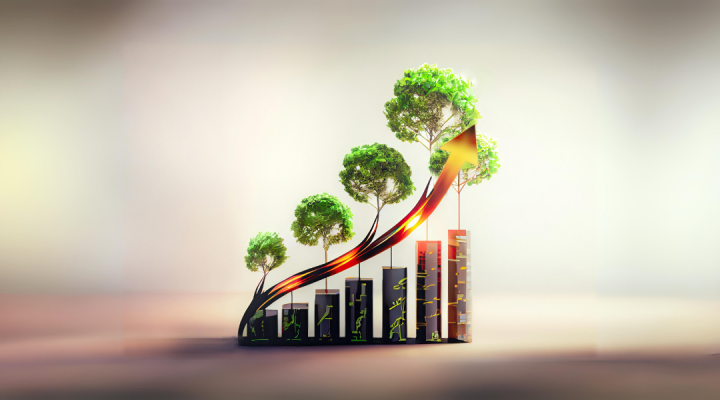By Anette Mikes and Steve New with Kim Stanley Robinson
It begins with a heat wave in India driven by climate change. In one week, 20 million people die. This fictional horror opens The Ministry for the Future, which then follows the drive for a global, coordinated effort to prevent further disasters. The ‘cli-fi’ (climate fiction) novel by acclaimed science-fiction author Kim Stanley Robinson and his creative imagining of the not-too-distant future has also inspired us to apply it to the real world, to meet the existential challenge of our times.
If the trajectory we’re currently on leads us to a choice between ‘utopia or catastrophe,’ can we create a third path: can we reform capitalism, governance and academia to instead head for Optopia - the best that is still possible in this world, given the political realities and economic constraints we have? We believe that it can still be done, though time is short.
Dread, greed and hope - The choice
Dread, as Robinson articulates so well, is the prevailing emotion of our time. We see the coming climate catastrophe and fear it but believe it is inevitable. Underlying this dread, there is a pervasive belief that capitalism in its current form is the only viable system (Capitalist Realism). However, this current form is best described as predatory and extractive - prioritising financial profit above all else, disregarding the negative impacts on the environment and society.
It is worth reflecting on what drives an economic system that keeps pursuing unmoderated growth on a planet with finite resources. The decision-makers can’t defend themselves by saying ‘We didn’t know.’ Perhaps our leaders share our feelings of helplessness and therefore fall into de facto nihilism, believing there is no meaning and no common good.
At a fundamental level, dread simply obliterates a worthwhile future: ‘I can’t build a better world or build a long-term company because we’re all going to fry. I might as well focus on the immediate game of limitless accumulation.’

The problem is that this story of inevitable doom drowns out other narratives that light a path to a positive and sustainable future.
Robinson counters this with a powerfully constructed, cautiously optimistic alternative. He proposes that there is a middle ground between the competing views of corporations and markets as either saviours or monsters.
Optopia is in this middle ground. We work with the existing political and economic framework, challenging and expanding its boundaries as we progress. In practical terms, many creative and realistic ways exist to move forward. We can develop new ways to account for both profit and environmental impact and develop innovative approaches to financing and reorganising the production and distribution of goods and wealth.
If our feelings of dread fuel willed optimism, we have choices and agency to create alternatives. We can create a new system, with sustainability and social justice at its core, which will support a liveable future. In other words, there is hope. But hope requires change.
Going Green
Green Capitalism has already shown its potential. Trillions have been invested in renewable energy, carbon capture technology and other emerging solutions. Corporate environmentalism sees climate change as an opportunity for innovation and profit.

In part, because there are ambitious policy initiatives from governments. The EU’s pledge to be carbon-neutral by 2050 means effective carbon prices are already at play, with carbon taxes being phased in over this decade. Those with high-carbon business models will find they’re losing out on profits and/or market reach. That’s a big stick. In the United States, part of the 2022 Inflation Reduction Act included subsidies amounting to $369 billion to encourage investment in low-carbon technologies. That’s a big carrot.
Some believe that such sticks and carrots will be enough for capitalism to change. We don’t share that view.
We envision a green capitalism in which corporations are held accountable for environmental and social stewardship not only by their shareholders, but by the public, too. There are two crucial elements to this.
- Accounting and governance reform - Effective management of the biosphere requires careful design, evaluation, and improvement of monitoring, control, and evaluation processes that create accountability for externalities imposed by corporations – and nation states, as the case may be. And an obligation (with legal oomph) on them for the respect, maintenance and restoration of the natural capital entrusted to them. Net zero commitments should be binding and auditable, as opposed to easily green-washable.
- Including all stakeholders - Rather than falling back on government or the corporation as an ‘either/or’ choice, we urge a ‘both/and’ approach, to be enhanced by a third stakeholder group: citizens. We need the active inclusion of communities and citizens in deciding our climate response and generating innovative solutions, in the form of, for example, citizens’ climate assemblies, local food and financial cooperatives or community-based energy projects.
The depth of reform needed will require not only political will but also collective action to see it through. Beyond traditional notions of Public and Private sectors, we could be inspired by Nobel Laureate Elinor Ostrom’s work challenging the dominant 'tragedy of the commons' theory - where individual self-interest dooms common resources to exhaustion.
Instead, she and her colleagues present a hopeful and diverse vision for polycentric governance - where common-pool resources, such as the global atmosphere, can be effectively governed by carefully designed institutions, talk and cooperation. Ostrom demonstrated casting a wide net for stakeholders can be a productive force - not simply sow the seeds of chaos.
From this perspective, we can positively impact man-made climate change not just through the lever of market forces, but also through changing the governance structures, institutions and processes used to govern ecological resources.
When we try to define the critical divides preventing progress toward Optopia; rather than seeing it as being between capitalism and the climate, it may be more accurate to see the challenge as between capitalism (in its corporate plutocratic form) and democracy.
Academia as ‘The Ministry for the Future’
The overall message of Ministry forces us to lift our eyes from our cluttered but comforting academic desktops to a threatening horizon that should be the dominant frame of our daily activity as researchers and teachers. We ought to be talking about this constantly. But it isn’t, and we don’t.
The book’s namesake, The Ministry for the Future, is set up as a new international body to advocate for the world’s future generations as if their rights were equal to the present population.
We envision a new role for ‘Academia as Ministry,’ as we all face this enormous challenge. One where we not only search for meaning and knowledge but advocate for future generations and help build a better, more equitable and liveable future. Our research traditionally emphasises detachment, description, and explanation. However, at this time, all hands on deck are needed. We have to actively participate – and indeed, we see the rise of activist academics in Oxford and beyond, building bridges between research projects and practitioners, and translating our ideas and learnings into pragmatic action.
As this crisis defies disciplinary boundaries, we must also engage across disciplines and divides. All our 'grand challenges' are interconnected, as are all the solutions. We need new accounting, finance and economic tools while drawing on the solutions coming from the natural and engineering sciences: a system-level response. In the meantime, we must cling ever more closely to rigour and truth and avoid the motivated reasoning that corrupts public discourse. For example, in the carbon-accounting field, multiple frames of reference exist and produce conflicting results, so some may argue that certain companies and countries are making significant improvements in decarbonisation, while others argue that this interpretation fails to fully account for the impact of imported goods or emissions imposed up and down the values chain. These are hard, empirical, technical issues—and we cannot let our opinion be determined by what we would like (for whatever reason) the answer to be or what we intuitively feel would be a helpful answer.
And finally, for Academia as Ministry to truly take root, we need to embrace Robinson's humanistic perspective. We can approach economics and management studies recognising the immense power of the stories we tell and how they shape our cooperation and economic lives. It's not just about numbers and data; it's about meaning, persuasion, and the values and commitments that drive our actions.
Facing ecological disaster, if we believe that the essence of managerial work is a project taken in service of future generations, its imbued meaning won’t allow defeatist, cynical, or selfish thinking.

Conclusion
As Kim Stanley Robinson said a few years back, ‘Climate change is inevitable—we’re already in it.’ However, we share his moral position that we can’t afford to give up. Reforming capitalism, governance and academia is a daunting task. Still, we must beat back the inertia of dread and begin forging our Optopia from where we stand right now. Robinson’s book ends with a repeated message: ‘There is no such thing as fate.’ We choose wilful, pragmatic optimism. We choose hope.
Further background
In 2021 when Anette read The Ministry of the Future it had a profound impact on her and her colleague Tom Fletcher, the Principal of Hertford College. As he said ‘now and again a book comes along that turns your world upside down and makes you ask fresh questions about our role as academics, our role as a university and our role as citizens in a good society, and this is one of those books.’ Hertford College then hosted a fascinating talk with Kim Stanley Robinson in 2022, Kim Stanley Robinson: From science fiction to climate action, which was the inspiration for Anette and Steve to write their research paper, How to Create an Optopia? – Kim Stanley Robinson’s “Ministry for the Future” and the Politics of Hope, from which this article is drawn.





